NewsBeat
LGBT veterans to get up to £70,000 in gay ban compensation
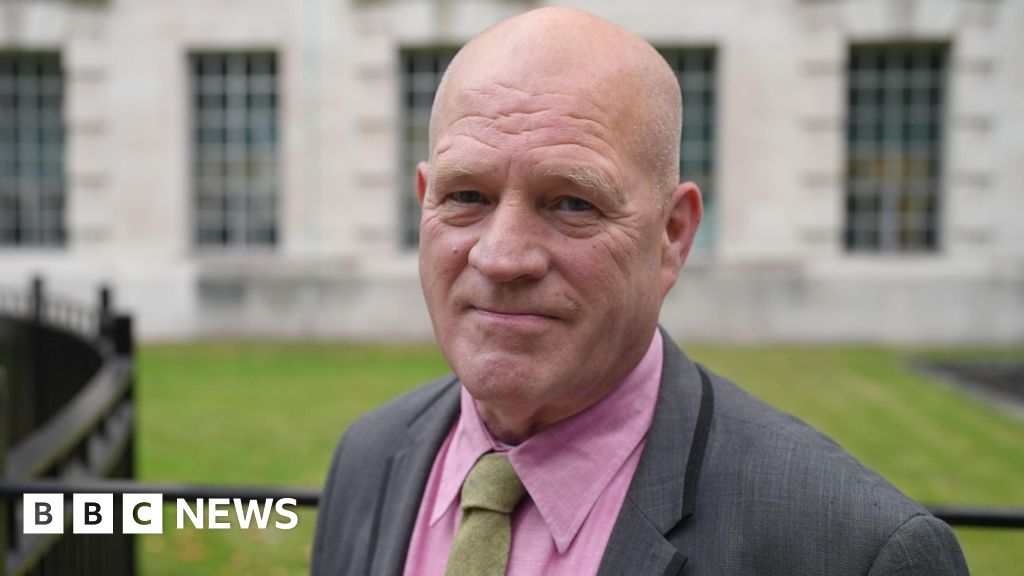
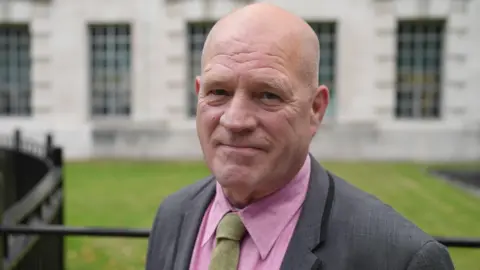 ANN GANNON/BBC
ANN GANNON/BBCLGBT veterans who were dismissed from the armed forces for being gay will be eligible to receive up to £70,000 in compensation, the government will announce on Thursday.
The Ministry of Defence said the move followed extensive engagement with LGBT veterans and campaigners.
Ministers will also announce that veterans can apply to have their rank restored and discharge reason amended.
The total amount available to affected veterans will be increased from a proposed £50m to £75m.
Applications will open on Friday for LGBT veterans who were dismissed or discharged because of their sexual orientation or gender identity to receive £50,000.
Additional payments of up to £20,000 will also be available for those negatively impacted by the ban on LGBT personnel between 1967 and 2000.
This is aimed at those who suffered harassment, invasive investigations and those who were sent to prison.
The exact amount of additional compensation will be decided by an independent panel.
All payments will be exempt from income tax and will not affect means-tested benefits.
Homosexuality started being decriminalised in the UK in 1967 but a ban continued in the armed forces until 2000.
Those who were or were perceived to be gay were often subjected to lengthy investigations before being discharged from the military.
‘Constant struggle’
Stephen Close, who joined the army when he was 18, said he will be hoping for some financial compensation.
Mr Close was convicted of the sexual offence of gross indecency after kissing another man while stationed in Berlin in the 1980s.
He lived as a convicted sex offender for 30 years before being pardoned in 2013.
“Because of my criminal record, I’ve had to go from job to job. I’ve built no pension whatsoever. I’ve no savings. I’ve never been on holiday. I don’t think I’ve ever had anything new. It’s just been a constant struggle all my life”, Mr Close told the BBC.
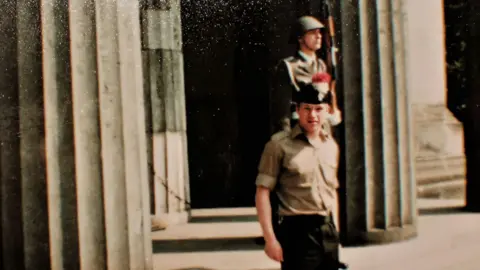 STEPHEN CLOSE
STEPHEN CLOSE“Mentally, it’s been absolutely terrible. I’ve suffered for many years with depression, anxiety, I have panic attacks”, Mr Close added.
Despite that, he said he is still “proud” to have served his country.
A National Audit Office report found that up to 4,000 veterans are expected to be eligible for compensation.
The LGBT Veterans Independent Review, led by Britain’s first openly gay judge, Lord Etherton, revealed decades of bullying, assaults and expulsions of LGBT servicemen and women – often leaving them without income or pensions.
On the report’s release, the then Prime Minister Rishi Sunak apologised in Parliament, calling the ban “an appalling failure” of the British state.
The government says the £75m available is significantly above the level recommended in the Etherton Review.
Veterans will be able to join the scheme from Friday 13 December.
NewsBeat
'People want answers quickly': Harriet Harman calls for time limits for public inquiries
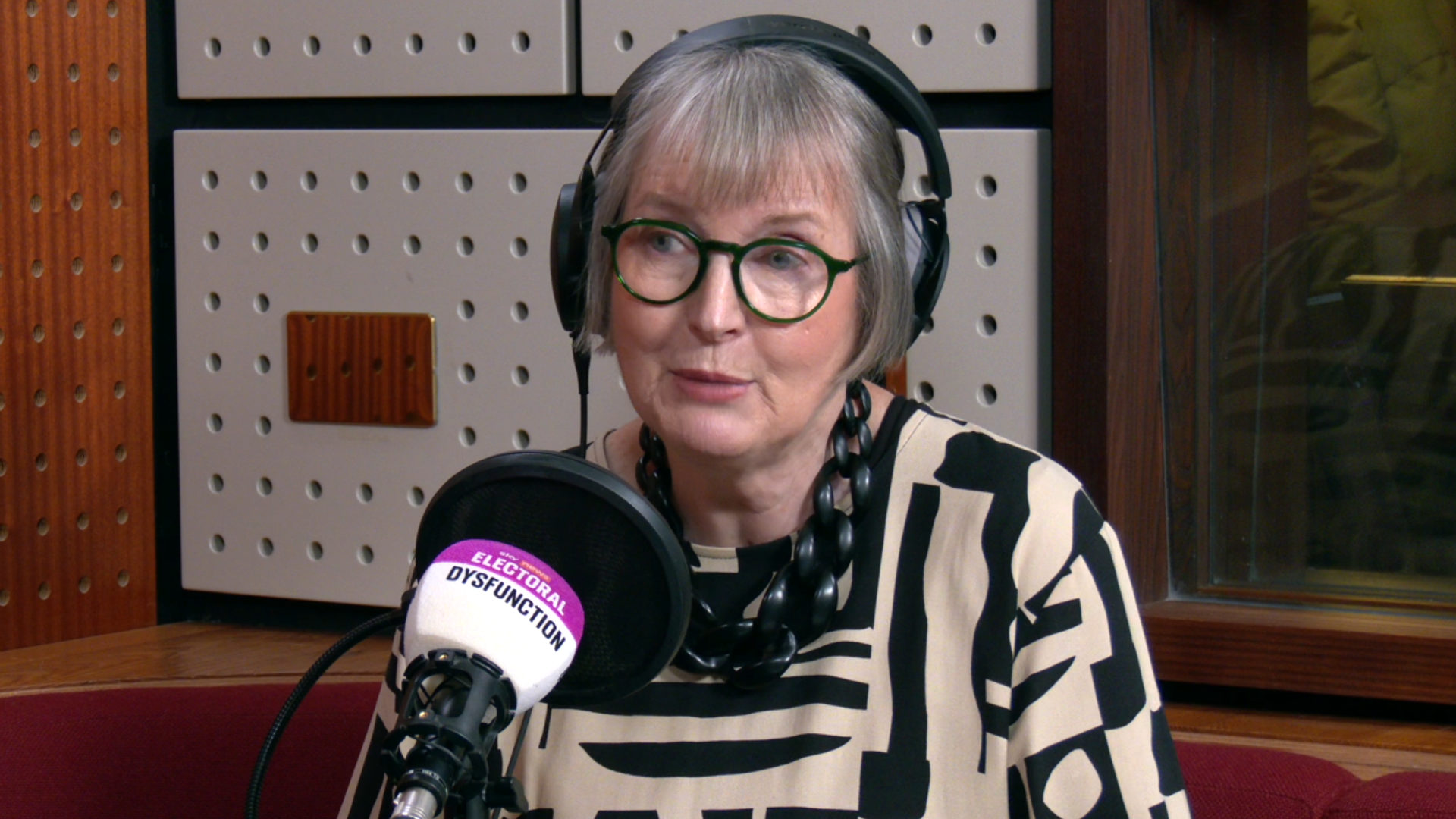

The government should set time limits for public inquiries and “not let them go on for years and years”, Harriet Harman has said.
NewsBeat
Axel Rudakubana latest: Southport killer ‘s52-year jail term to be reviewed as families share pain and anger
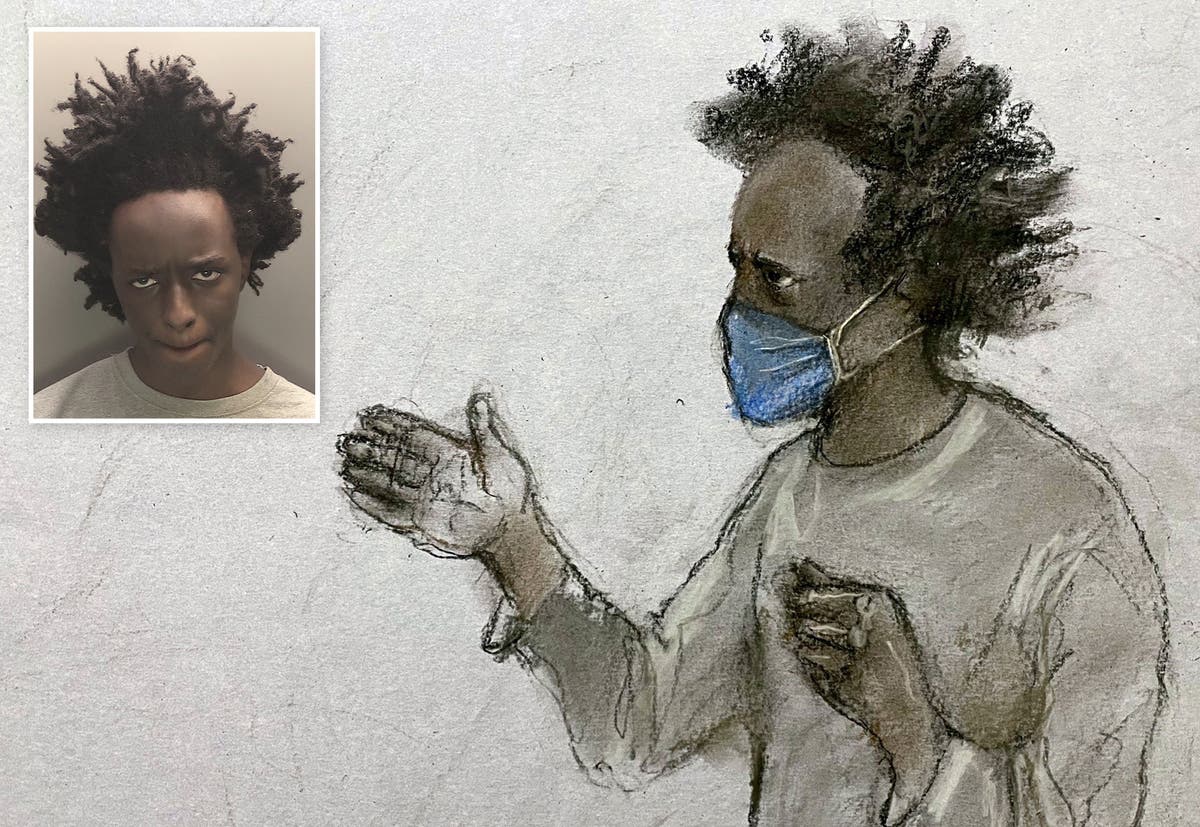
Southport killer Axel Rudakubana’s 52-year jail term is set to be reviewed after concerns were raised it was unduly lenient.
The 18-year-old was jailed for life after murdering three young girls and stabbing several others in an act of “extreme violence” at a Taylor Swift themed dance class.
He was sentenced in his absence after failing to return to the dock, and will now spend decades behind bars for what the judge termed “the most extreme, shocking and exceptionally serious crime”.
Rudakubana avoided a whole-life tariff – which would have ensured he could never leave prison – because he was nine days shy of being 18 when he committed the atrocity. The 52-year sentence is a record length for a person of his age.
Southport’s Labour MP Patrick Hurley has now asked the Attorney General to review the sentence as “unduly lenient”.
Attorney General Lord Hermer and Solicitor General Lucy Rigby now have 28 days to decide whether to refer the sentence to the Court of Appeal.
The families of Rudakubana’s victims shared their pain and anger inside Liverpool Crown Court. Mother of murdered seven-year-old Elsie Dot Stancombe, Jenny, described the attack as “the act of a coward” and said Rudakubana was “cruel and pure evil”.
Violent images of dead bodies, beheadings and rape found on his devices
Officers found violent content on Axel Rudakubana’s devices including images of dead bodies, victims of torture, beheadings, cartoons depicting killing, violence and rape or which insulted or mocked different religions, including Islam, Judaism and Christianity, Liverpool Crown Court heard.
Prosecutor Deanna Heer KC said there were numerous images relating to different wars and international conflicts, including in Gaza, Ukraine, Sudan, Korea, Iraq and the Balkans.
The court heard a number of documents were found which also related to war, weapons and genocide.
These included documents called “A concise history of Nazi Germany,” “Death and survival during the 1994 genocide in Rwanda,” and “Examination of punishments dealt to slave rebels in two 18th Century British Plantation Societies”.
Alexander Butler24 January 2025 04:00
Rudakubana had document on ‘how to carry out a knife attack’
Police found a document called “Military studies in the Jihad against Tyrants: The Al-Qaeda Training Manual” on a tablet belonging to the defendant, the court heard.
Ms Heer said of particular relevance were; a passage referring to assassination and mass murder; a section called “Assassinations Using Cold Steel: A: Assassinating with a Knife” which gave advice on where the “enemy” should be struck in order to kill; and “Assassinations with Poison,” which gave information on the production of ricin and explained that it is considered one of the most deadly poisons.
The prosecutor said: “The manual had been downloaded on three occasions in 2021, meaning that it was already in the defendant’s possession when he purchased the castor beans from which he produced the ricin in early 2022. If that is right, then he clearly knew just how deadly a substance it was before he produced it.
“Furthermore, by the time he went to The Hart Space in 2024, the defendant was in possession of instructions in the manual on how to carry out a knife attack with lethal force.”
Alexander Butler24 January 2025 03:00
Man who confronted Axel Rudakubana moments before Southport attack had no idea of ‘unspeakable’ horror ahead
Alexander Butler24 January 2025 02:00
Rudakubana researched car bombs, detonators and nitric acid amid fixation with violence
Alexander Butler24 January 2025 01:00
Southport killer Axel Rudakubana gloated he was ‘glad they’re dead’ after murdering three children
Alexander Butler24 January 2025 00:01
Tears, shock and relief: Inside the courtroom where Southport killer Axel Rudakubana was jailed for 52 years
Alexander Butler23 January 2025 23:41
How a violence-obsessed teen unleashed horror at Southport children’s dance class
Alexander Butler23 January 2025 23:00
Watch: Axel Rudakubana sentenced to 52 years for Southport murders
Alexander Butler23 January 2025 21:38
Home secretary says ‘cowardly, evil’ crimes horrified UK
Home secretary Yvette Cooper said Axel Rudakubana’s “truly horrendous, cowardly and evil crimes” had horrified the UK as she repeated pledges to ensure lessons were learnt from the horror.
“The whole country has been horrified beyond words by these truly horrendous, cowardly and evil crimes,” she said.
“We will always remember Bebe, Elsie and Alice, and the happiness they brought to their families in their short lives.
“And we will remember too the strength and bravery shown by the survivors of this horrific attack, and the astounding courage of those who rushed towards danger and undoubtedly saved many more lives.
“The police and emergency services who responded that day deserve our eternal gratitude, and we thank too the investigators and prosecutors who have worked so hard for justice, and Mr Justice Goose for presiding over these hugely difficult proceedings.
“We have vowed to get the answers the country deserves about how this horror was allowed to happen and to ensure that lessons are learnt.
“I will set out further details of the independent public inquiry soon, but for today all our thoughts are with the families enduring this unimaginable pain, and the example of strength and courage they have provided to us all.”
Jane Dalton23 January 2025 20:21
Grieving father says killer should have been tried as adult
A parent of one of the children who survived the attack said Rudakubana’s crimes were so horrific he should “rot in jail” and the “law needs changing”.
“Life should mean life,” the father told The Sun. “He’s an adult and should be tried like one.”
Rudakubana will have to serve the minimum term of his sentence, which will be subject to a review by the Parole Board before he could ever be considered for release.
Taking into account the 175 days he has already served on remand, the court heard this meant he will be required to serve 51 years and 190 days before this can happen.
Jane Dalton23 January 2025 20:04
NewsBeat
Women’s Ashes: Rain stops play with five balls remaining
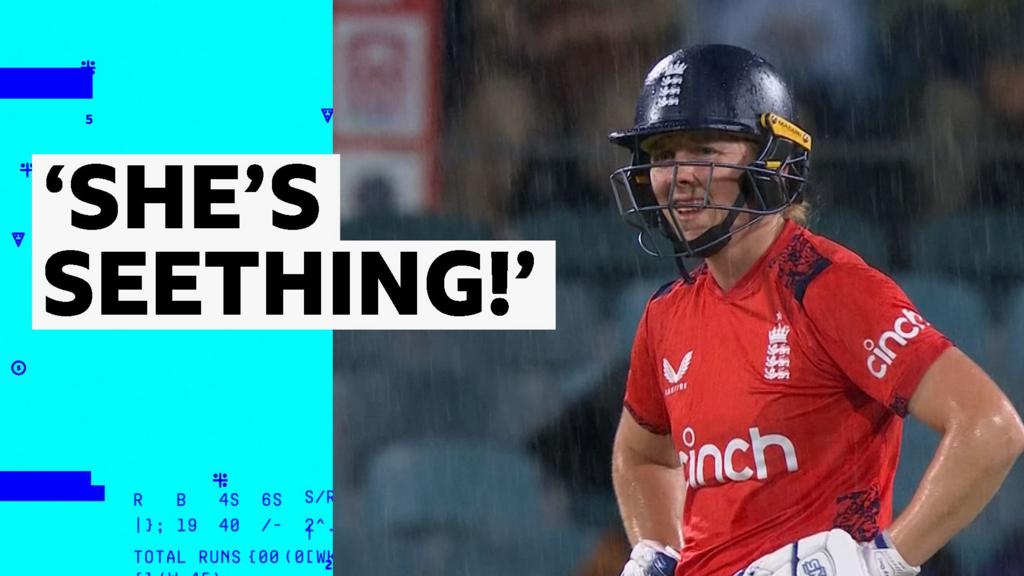
Australia beat England by six runs via the DLS method as rain stops play with just five balls remaining and Heather Knight’s team agonisingly short of their target in the second T20 in Canberra.
Follow Live: Australia v England – Second T20
Available to UK users only.
NewsBeat
Emilia Pérez, Wicked and The Brutalist lead race
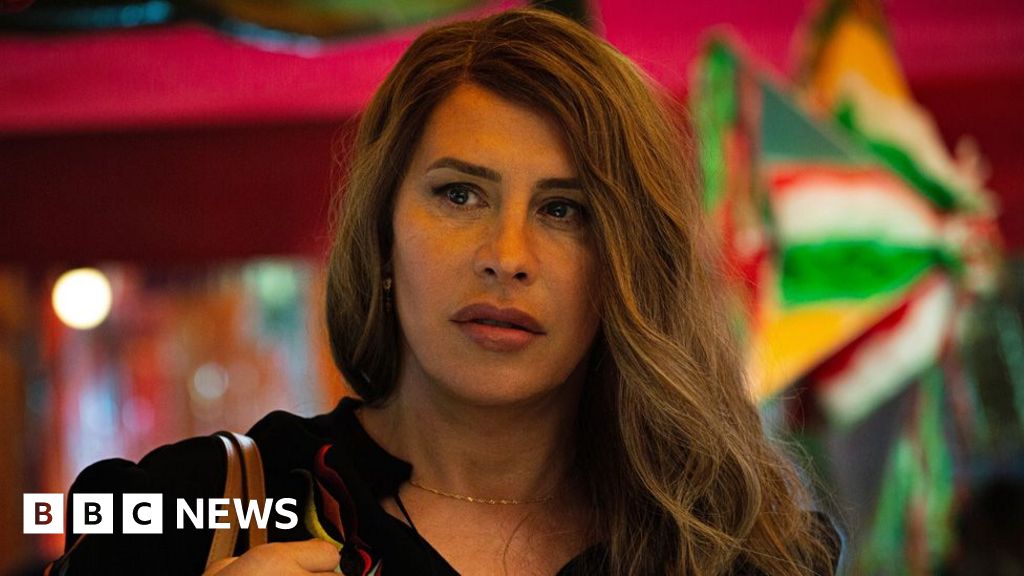
Culture reporter
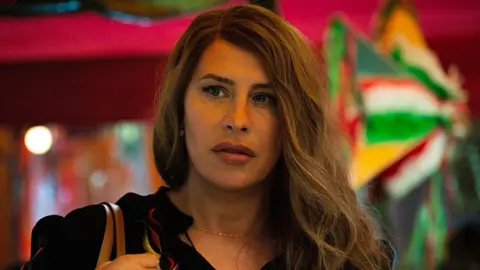 Netflix
NetflixNetflix musical Emilia Pérez leads this year’s Oscars nominations, with Wicked also among the top contenders.
Emilia Pérez, about a Mexican drug lord who changes gender, has 13 nominations in total – although one of its stars, Selena Gomez, missed out.
Wicked received 10 nominations – including nods for British actress Cynthia Erivo and her co-star Ariana Grande.
Three-and-a-half-hour epic The Brutalist, starring Adrien Brody, also has 10 nominations, while Demi Moore has the first Oscar nomination of her career.
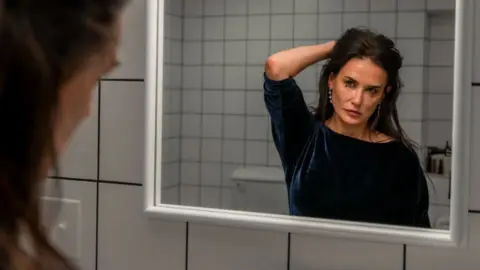 Mubi
MubiMoore, 62, is nominated for best actress for playing a fading star who swaps her body for a younger and more beautiful version of herself in The Substance.
She said an Oscar nomination was “an incredible honour and these last few months have been beyond my wildest dreams”.
Referring to the wildfires in Los Angeles, she continued: “This is a time of incredible contrasts and right now, my heart is with my friends, family, neighbours, and community here in LA.”
In the best actor category, two big names are in contention for portraying the early years of very different real-life figures – Sebastian Stan for playing Donald Trump in The Apprentice and Timothée Chalamet for playing Bob Dylan in A Complete Unknown.
That makes Chalamet, 29, the youngest person to get two best actor nominations since James Dean in the 1950s, according to Variety.
But 2003 best actor winner Brody is favourite to scoop that prize again, for playing a Hungarian architect hired by a wealthy American after World War Two in The Brutalist.
The top nominees:
- Emilia Pérez – 13 nominations
- Wicked – 10
- The Brutalist – 10
- A Complete Unknown – 8
- Conclave – 8
The Academy Awards ceremony, hosted by US comedian Conan O’Brien, will take place on 2 March.
The nominations had been due to be announced last week, but were postponed twice because of the fires.
Organisers have said the ceremony will “reflect on the recent events while highlighting the strength, creativity, and optimism that defines Los Angeles and our industry”.
Emilia Pérez makes history
 Reuters
ReutersEmilia Pérez, which follows the leader of a Mexican drugs cartel who decides to change gender and identity, hasn’t set Netflix alight so far and has divided opinion among those who have watched it.
But Oscar voters have given it a resounding seal of approval.
It it the most-nominated non-English language film of all time. It’s actually a French production, is set mostly in Mexico and is mostly acted in Spanish.
Karla Sofía Gascón is nominated for best actress for the movie’s lead role, making her the first trans person to be nominated in an acting category (although Elliot Page was nominated for Juno in 2008, before the actor transitioned).
Zoe Saldaña, who plays Perez’s lawyer, is up for best supporting actress (despite having more screen time than Gascón). The film’s only notable omission is Selina Gomez, who was an outsider for a nod in the same category for playing Perez’s wife.
Brits in contention
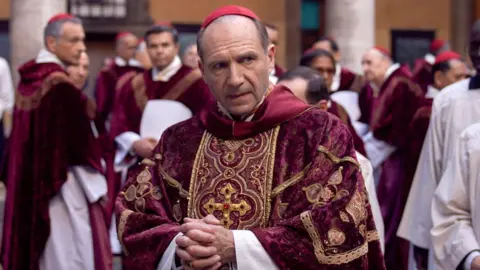 Black Bear
Black BearErivo is the first black British woman to receive two Oscar nominations for acting, after also being nominated for Harriet in 2020.
If she wins best actress this time, for playing Elphaba in Wicked, she’ll become an EGOT – having completed the set of Emmy, Grammy, Oscar and Tony awards.
Ralph Fiennes is flying the flag in the best actor category with his first nomination for 28 years. He’s recognised for playing a cardinal who oversees the selection of a new Pope in Conclave.
Elsewhere, Felicity Jones is nominated for best supporting actress for The Brutalist – a decade after her first Oscar nomination – while Sir Elton John is in the best original song race.
The country will also be rooting for two more screen legends – Wallace and Gromit (and their makers Aardman Animations), who are hoping for their fourth Oscar. They are shortlisted for best animated feature for their latest outing, Vengeance Most Fowl.
Creator Nick Park told the BBC the nomination was a “surprise and real privilege”, while co-director Merlin Crossingham said he “nearly spilt my tea” when hearing the news before adding that “we all had a huge cheer and celebration”.
Wicked casts an Oscars spell
 Reuters
ReutersWicked, based on the Broadway musical about the origin story of the Wicked Witch of the West from the Wizard of Oz, has been a big box-office success and is now also a hit with Oscar voters.
It has exceeded many expectations with its 10 nominations – two more than Barbie managed last year.
After their widely-praised performances in both the film and on the press tour, Erivo and Grande will be reunited on the Oscars red carpet.
Grande said she “cannot stop crying” after receiving the first Academy Award nomination of her career.
However, the film’s mastermind Jon M Chu missed out on a nomination for best director.
Other snubs
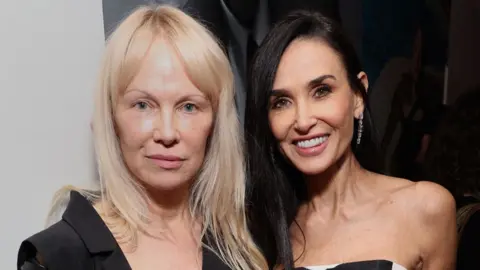 Getty Images
Getty ImagesPamela Anderson had scored Golden Globe and Screen Actors Guild nominations for her vulnerable and powerful performance as an ageing Las Vegas performer in The Last Showgirl, but has missed out at the Oscars.
Best actress is a competitive field, and other big names including Angelina Jolie (Maria) and Nicole Kidman (Babygirl) were also overlooked.
British actress Marianne Jean-Baptiste could also have been a contender for playing a constantly miserable woman in Mike Leigh’s Hard Truths.
Jamie Lee Curtis lost out on a spot in the best supporting actress category for her role alongside Anderson in The Last Showgirl, while Gladiator II’s Denzel Washington couldn’t notch up the 10th acting nomination of his career.
In fact, 24 years after the original Gladiator won five Oscars, the sequel could only manage a single nomination, for best costume design.
Former James Bond star Daniel Craig had a chance for his first Oscar nomination – but voters overlooked his performance in Queer, as a gay man who ventures into the jungle in search of a plant with telepathic qualities.
And Irish-language rappers Kneecap were disappointed – their film, which received six Bafta nominations last week, was overlooked by the Oscars.
Read more about this year’s nominated films:
NewsBeat
UK has not ruled out post-Brexit EU food trade deal, says Jonathan Reynolds
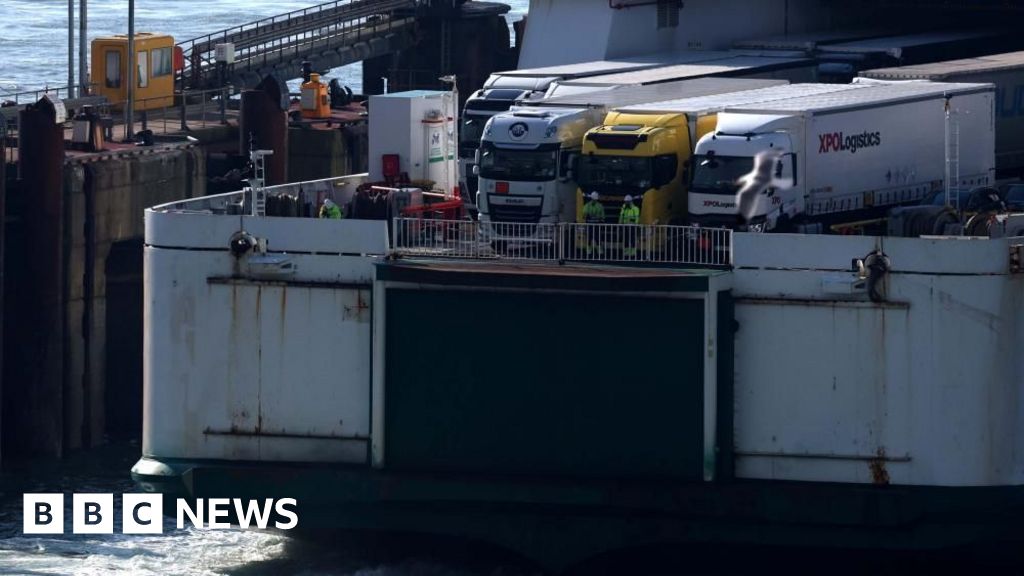
The UK has left open the possibility of following EU rules for food and farm products in order to return to frictionless access to European markets, the trade secretary has said.
Jonathan Reynolds told the BBC such an agreement – which lowers all trade barriers in return for mirroring EU rules and standards – would not cross the government’s red lines.
His comments come after EU Trade Commissioner Maros Sefcovic told the BBC a new agreement, including so-called dynamic alignment on standards, is possible alongside other areas of pan-European co-operation on customs.
Reynolds met Sefcovic at the World Economic Forum in Davos on Thursday.
He said he thanked his EU counterpart for his “incredibly positive” and “helpful” comments. Reynolds add that Sefcovic’s tone was in keeping with what the government had already said about a “twin- track strategy” on trade.
“We can improve the terms of trade with the EU in a way which doesn’t revisit customs unions or single markets or the arguments of Brexit, and we can do that whilst pursuing closer trade links around the world,” Reynolds said.
Labour fought last year’s UK general election with a manifesto pledge to lower Brexit-related barriers and red tape for the export of food and farm products to the European Union.
The question has always been how deep such an agreement might be. It could be settled in the coming weeks, though firm decisions have not yet been made.
on Thursday the EU suggested to the BBC that complete eradication of barriers in the sector would be possible if the UK followed relevant EU rules and standards as they change, a process known as “dynamic alignment”.
Speaking to the BBC in Davos, Reynolds said that both ideas floated by Sefcovic – a fully fledged veterinary agreement with dynamic alignment – and a pan-European customs plan did not break the government’s red lines.
On the Pan-Euro-Mediterranean Convention he said it did not cross red lines because “it is not a customs union”.
Asked if a “full-fat veterinary agreement with dynamic alignment” crossed red lines he said: “No, that’s part of our manifesto, an SPS agreement, a veterinary agreement.”
The Conservatives have voiced anger at reports of a potential new deal on UK-EU trade, with shadow foreign secretary Dame Priti Patel telling MPs that the government was “bending the knee to the EU”.
“These latest reports that the government might shackle us to the European Union are deeply concerning, and once again make clear that Keir Starmer and his chums are all too happy to put their ideology ahead of our national interest, no matter the cost,” she said.
But the Liberal Democrats have said the government is not doing enough to smooth trade with the EU.
Party leader Sir Ed Davey told the Commons: “It is time for a proper UK-EU customs arrangement so we can strengthen our negotiations with Donald Trump, cut the red tape on our businesses and grow the economy.”
Reynolds told the BBC he was preparing the UK’s case to avoid potential US tariffs on exports, after President Donald Trump suggested the world could have to pay trillions of dollars to access markets in America.
NewsBeat
Which film came out top in the Oscar nominations?

After being delayed twice because of the recent devastating wildfires around Los Angeles, this week saw the nominations announced for the film industry’s biggest awards, and Donald Trump move into the White House for a second time.
But how much attention did you pay to what else had been going on in the world over the past seven days?
Quiz compiled by Ben Fell.
NewsBeat
New code of practice for getting a dog in Scotland
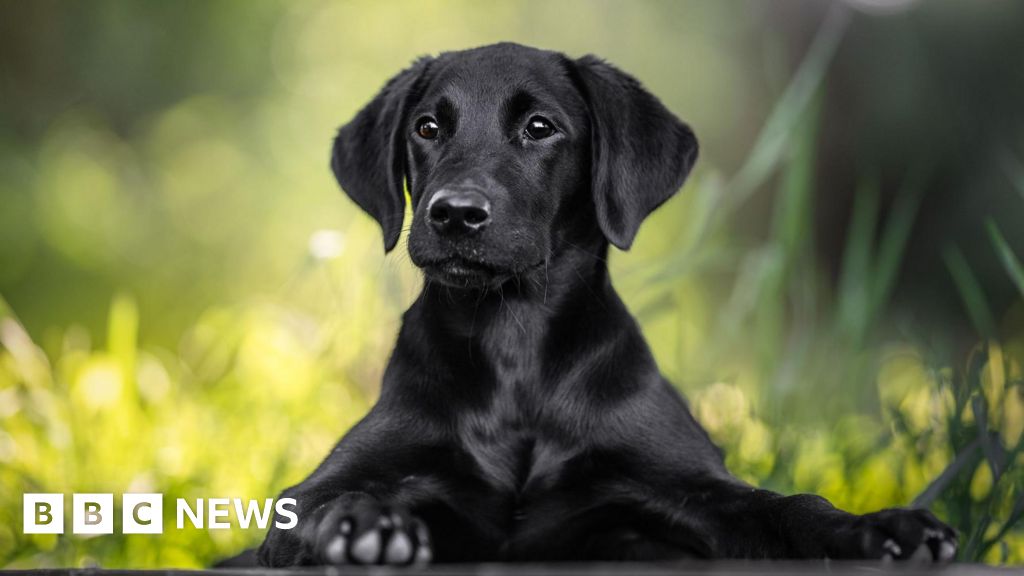
BBC Scotland political correspondent
 Getty Images
Getty ImagesA code of practice for getting a dog is to be drawn up in Scotland under a new law passed by MSPs.
The Welfare of Dogs Bill aims to promote responsible ownership by making sure people understand the commitment required before they take on a pet.
Within 12 months the government will need to draw up a code, effectively a checklist of questions about whether the new owner has considered whether they have the time, space and money needed.
That would then inform a certificate, to be signed by the new owner and the person they are acquiring the dog from, to underline that both sides understand the commitment involved.
The new law is a member’s bill introduced by SNP MSP Christine Graham, who has been pushing for changes for more than seven years.
The Midlothian South, Tweeddale and Lauderdale MSP first tabled a Welfare of Dogs bill in 2018 but saw it fall at the end of a term of parliament curtailed by Covid.
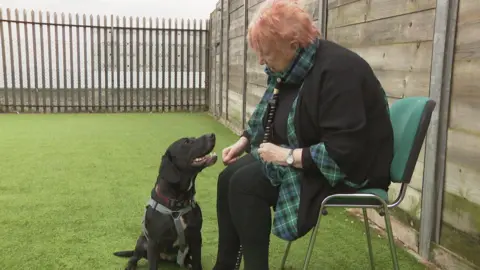
The inspiration behind the bill can readily be seen at Edinburgh’s dog and cat home, where Ms Grahame is a regular fixture – she literally has her name on the wall.
The facility is currently at capacity for dogs following a “worrying” increase in strays being brought in.
One of them is Susan, a four-year-old labrador-staffie cross. She is a friendly dog who has clearly had some training – she can sit, and offer a paw in exchange for a treat – but came in as a stray in October, having presumably been abandoned.
The home’s chief executive Lindsay Fyffe-Jardine says dogs do come to them because good owners see their circumstances change, through no fault of their own.
But she said there was also an issue with “decisions which perhaps aren’t talked through before purchase”.
She said: “It’s as easy to go out to the supermarket to buy your cereal as it is to get a dog from lots of different places and the reality is not everyone stops to think ‘can I afford this dog? can I fit them into my life?’.
“Because it’s a huge commitment.”
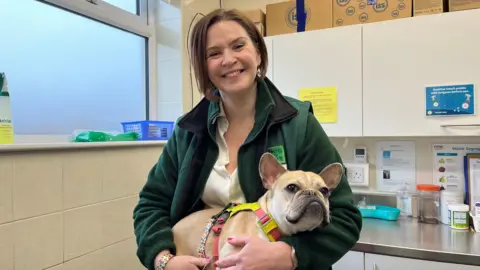
This is where Christine Grahame’s bill comes in.
The new law requires the government to produce – within 12 months – a code of practice which sets out steps that should be taken when buying, selling or giving away a dog.
This code must include a checklist of questions which prospective dog owners should ask of themselves and of the person they are acquiring the animal from.
These questions are intended to fit on a single side of A4 paper, and would include things like:
- whether the breed of dog is suitable for the new owner
- whether they have a suitable environment to house it
- whether they have time to exercise regularly
- whether they can afford the costs of having a pet on an ongoing basis
- and whether they can commit to caring for the dog throughout its entire life
The new owner would then have to sign a certificate showing that they have considered the questions set out in the code, while the seller would sign it to attest that they are content to hand the dog over.
This certificate isn’t a licence or a legally binding document. The point is to make people think carefully about what dog ownership entails before they take on a new pet.
 Getty Images
Getty ImagesThere is already a 28-page code of practice for dog owners, which was introduced in 2010 under previous animal welfare reforms.
But Ms Grahame contends that few will have actually read that code, and that one which needs to be signed up to at the point of buying a dog would focus minds at the critical moment.
The Conservatives pushed to simply merge the two codes at committee stage, but otherwise there has been little dissent over the plans as they now stand.
The bill originally also included proposals to set up a Scotland-wide database for registering all dogs bred in unlicensed litters.
However, this was dropped after the government said it was “not convinced that developing a registration scheme would be an effective or proportionate way” to tackle issues around irresponsible breeding.
The final debate on the bill also included a row about shock collars, after Green MSP Ross Greer attempted to add in a ban on them at the final stage of debate.
This was voted down after the government pledged to return to the issue once further independent reports on the devices has been completed later this year.
NewsBeat
Southport murders: The 14 minutes of terror that left three children dead | UK News
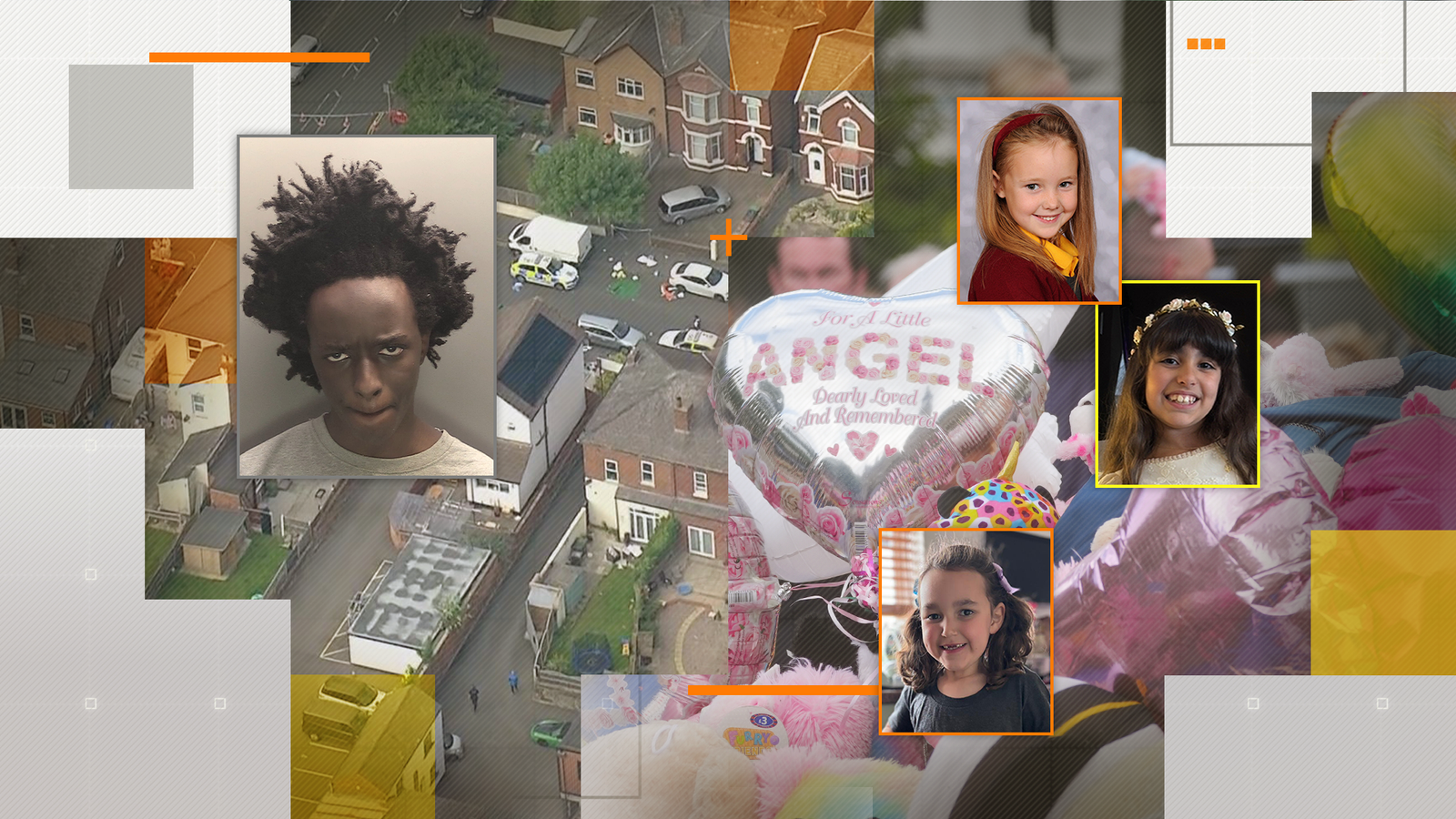
Warning: This article contains graphic references to violence
When yoga instructor Leanne Lucas posted an advert for a Taylor Swift-themed holiday club in Southport, the two-hour dance class sold out within 11 days.
It was a beautiful summer’s morning on 29 July when 26 children, all girls aged between six and 13, were dropped off by their parents to dance, play and make friendship bracelets.
Meanwhile, at his family home in the nearby village of Banks, Lancashire, Axel Rudakubana, then 17, armed himself with a 20cm kitchen knife he had earlier bought on Amazon.
This is a timeline of what happened next:
Follow latest: Dance class killer Axel Rudakubana sentenced
10am: The workshop led by Leanne and her colleague Heidi Liddle gets under way.
11.04am: Rudakubana searches online for “Mar Mari Emmanuel stabbing” – the knife attack on a bishop in Sydney, Australia, earlier that year.
11.10am: Despite the sunshine, he is wearing a green hoodie with the hood up and a surgical face mask covering his face when he leaves his home in the village of Banks in Lancashire.
11.11am: One minute later, he is captured on CCTV at a bus stop making a call to book a taxi.
11.16am: Around five minutes later he heads back towards home.
11.30am: Rudakubana is picked up and travels in silence for the 4.5-mile journey to Hart Street in Southport.
On the first map start with the marker at the bottom and then click next.
11.43am: When he arrives, he asks the driver to direct him to 34a. But he refuses to pay the driver, who then follows him down a driveway towards Masters Vehicle Body Repairs at number 36a.
Read more:
What are the UK’s knife crime laws?
Southport attacker had ‘kill list’
11.44am: Rudakubana retreats after the owner of the car repair workshop, Colin Parry, and his colleague confront him, telling him to pay the fare but Rudakubana replies: “What are you going to do about it?”
Inside the dance studio, on the first floor of an industrial unit down a path off the main road, children are gathered around tables making bracelets, while a life-size model of Taylor Swift stands nearby for the youngsters to pose for photos with.
As Ms Lucas opens a window because of the hot weather she sees the teenager outside but thinks nothing of it.
11.45am: Rudakubana walks into the 34a Hart Street building, climbs up the stairs to the first floor and opens the door armed with the black-handled kitchen knife.
Without saying a word, he grabs the girl nearest to him and begins stabbing her, before moving through the room, stabbing as many children as he can.
11.46am: CCTV shows one child as she tries to escape the building but is dragged back in by Rudakubana, before she staggers out and collapses.
11.47am: Merseyside Police receive their first emergency call.
11.48-11.56am: North West Ambulance Service respond after a call reporting the stabbings.
On the below map start with the marker at the bottom and then click next.
Window cleaner, Joel Verite, then 25, is driving past with his work partner. They stop to help Leanne Lucas who has been stabbed in the back before fleeing the building with several children. She tells them children are being attacked.
Mr Verite runs down the driveway to the dance studio where a mother waiting to collect her daughter has parked. She has her daughter in the car and three other girls who have managed to escape.
She asks him to help a child who has been stabbed several times. He later described opening the door behind the driver’s seat to find the girl “had many holes in her body”.
Mr Verite carries the child back to the street, where other members of the public are gathering to help. Then he runs to the building’s entrance, where he is told by two men the attacker is in the dance studio.
Mr Verite sees a man at the top of the stairs with his hood up, holding a knife. The attacker moves away when seen, while Mr Verite calls “for everyone to come over and block him in”.
On the below map start with the marker on the left and then click next.
Jonathan Hayes is at work in an office located across the landing from the dance studio when he hears screaming and looks out of the window to see some children running across the car park.
He leaves his desk intending to go outside to help but, as he walks on to the landing, he sees a child on the floor, motionless and bleeding. The attacker is crouching over her but starts to follow Mr Hayes as he retreats. Mr Hayes tries to grab the knife and the defendant swipes at him and stabs him in the leg. His colleague chases Rudakubana out of the office and shuts the door.
Car repair shop owner Colin Parry is also now on the scene, after being phoned by a colleague who’d heard the screaming next door. He sees children running past, some lying on the floor injured.
11.57am: The first police officer, Sergeant Gillespie, arrives at the scene to find Rudakubana holding the knife, which he drops when ordered to do so by the officer.
Mr Verite, a former rugby league player for Wigan and Salford, follows officers inside and sees blood everywhere as two officers tackle the attacker to the floor. He carries an injured child out to an ambulance and stays with her.
Police find Heidi Liddle and a little girl she protected hiding in a toilet. They are escorted from the building crying.
11.59am: Rudakubana is arrested on suspicion of attempted murder, then further arrested on suspicion of murder three minutes later.
Rudakubana stabbed 11 children and two adults (Leanne Lucas and John Hayes) – causing the deaths of Alice da Silva Aguiar (nine), Bebe King (six) and Elsie Dot Stancombe (seven).
He was taken to Copy Lane police station where he remained silent throughout his interviews with officers.
Despite later discovering he had a wide interest in violence, genocide and terrorism from an analysis of his digital devices, police say they still don’t know why he carried out the attack.
In the hours after the stabbings, false rumours spread online claiming the suspect was an asylum seeker who had arrived in the UK on a small boat, sparking a wave of rioting and unrest across the country.
Read more:
Southport murders: Missed opportunities
‘Terrorism has changed’, PM says
On Monday, as his trial was about to start, Rudakubana pleaded guilty to the three murders and 10 other charges of attempted murder.
He also pleaded guilty to production of a biological toxin, ricin, found in a container under his bed the day after the attack, and possession of an academic analysis of an al Qaeda training manual under the Terrorism Act.
When he was charged with the offences in October, police maintained the attack was not being treated as a terrorist incident.
During the sentencing hearing, Rudakubana repeatedly called for proceedings to be stopped, shouting: “I need to see a paramedic because I feel ill.” He was removed twice from court and wasn’t present to hear his sentence.
In his absence, Mr Justice Goose sentenced the 18-year-old to a life sentence with a minimum term of 52 years. The judge said “it is likely he will never be released and will be in custody for all his life”.
Explaining his decision, the judge added: “The prosecution have made it clear this does not meet the definition of an act of terrorism within the meaning of the legislation as there is no evidence the purpose was to advance a particular political or ideological cause. I must accept that conclusion.
“However, his culpability is equivalent in its seriousness to terrorist murders, whatever his purpose.
“What he did on July 29 caused such shock and revulsion that it must be seen as the most extreme level of crime.”
Additional reporting by Adam Parker, OSINT editor, and Freya Gibson, junior OSINT producer. Maps credit: Google Earth
The Data and Forensics team is a multi-skilled unit dedicated to providing transparent journalism from Sky News. We gather, analyse and visualise data to tell data-driven stories. We combine traditional reporting skills with advanced analysis of satellite images, social media and other open-source information. Through multimedia storytelling, we aim to better explain the world while also showing how our journalism is done.
Anyone feeling emotionally distressed or suicidal can call Samaritans for help on 116 123 or email jo@samaritans.org in the UK. In the US, call the Samaritans branch in your area or 1 (800) 273-TALK
NewsBeat
Landslide election cost £52.8m in staff turnover payments, Ipsa says
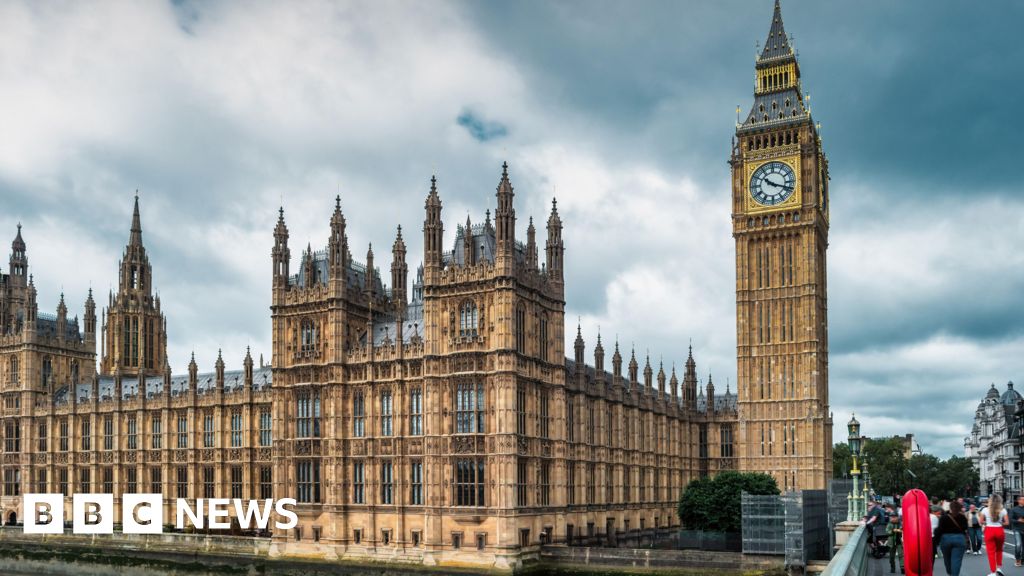
The cost of replacing more than 2,000 MPs and political staff after the election reached £52.8m, the body managing MPs’ pay has revealed.
Nearly all of that was spent on closing down former MPs’ offices and helping new MPs set theirs up, with around a third of the total spent on redundancy payments for staff.
The Independent Parliament Standards Authority (Ipsa) report said Labour’s landslide election had been a “once in a generation event” which saw 350 MPs leave office – more than at any general election in the last fifty years.
According to its report, 2,373 people lost their job as a result – including 2,023 staff who worked for MPs who either lost their seat or stood down.
At the 2019 election only 460 members of staff were effectively made redundant.
Ipsa, which is funded by public money through a grant from the Treasury, said the “almost-unprecedented” turnover had helped push up the cost of supporting those who lost their jobs by 286%.
Costs included ending rental agreements, settling outstanding payments and making staff redundant.
MPs themselves were entitled to a loss of office payment, set at twice the legal minimum, if they lost their seat and had been an MP for at least two years.
All MPs who either lost or stood down were also eligible for so-called “winding up” payments worth four month’s salary. Since April 2024, the basic annual salary of a MP is £91,346, plus expenses.
This was to compensate them for the time spent closing down their offices, which was extended at this election from two months to four. They could also claim costs during this time.
Ipsa said an average of £35,200 was spent per MP on redundancy payments to both MPs and their staff – up from an average of £19,900 at the 2019 election.
Ipsa’s chair Richard Lloyd said: “An MP’s office is like a small business. They are the employer, and any MP not returned in the 2024 general election had until 4 November to close down their office entirely.”
He added: “Ipsa is proud of its role in supporting a representative Parliament, where people without private finances shouldn’t be prevented from becoming an MP – or working for one.”
Established in the wake of the 2009 expenses scandal, Ipsa oversees both MPs’ pay and expenses, including the salaries of the constituency caseworkers, parliamentary assistants and other staff that work for them.
NewsBeat
Children in B&Bs beyond legal limit as homelessness crisis pushes councils to ‘breaking point’ | Politics News
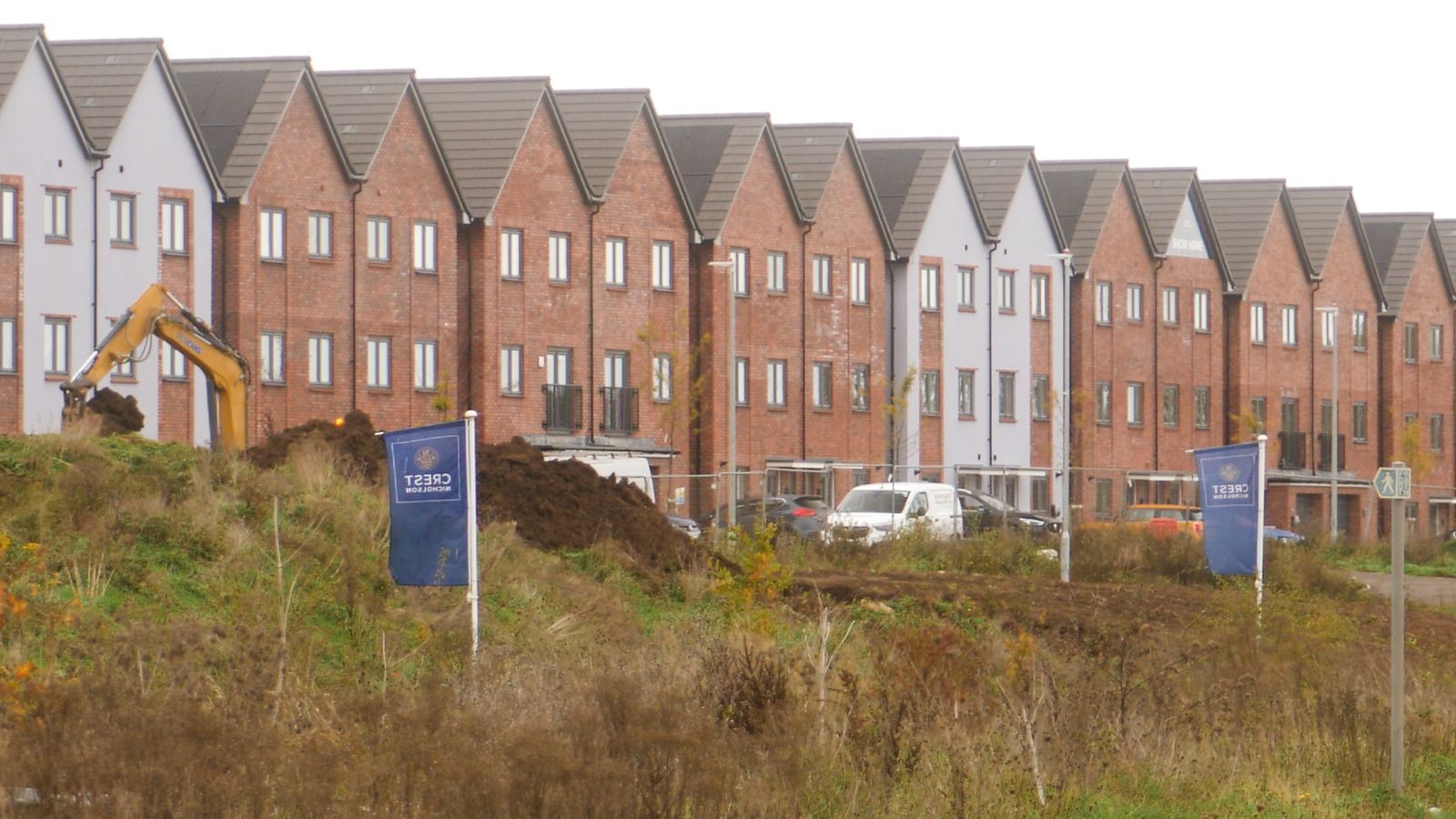
A record number of children are living in B&Bs beyond the legal limit as England’s homelessness crisis pushes councils to breaking point.
MPs said there is a “dire need” for housing reform, with the lack of affordable homes forcing cash-strapped local authorities to haemorrhage their funds on temporary accommodation.
The “crisis situation” means there is less money in the pot to focus on homelessness prevention, the cross-party Public Accounts Committee (PAC) said.
Councils are instead having to prioritise short-term solutions which can include putting families in bed and breakfasts – the fastest rising temporary accommodation type over the past decade, a Sky News analysis of government data found.
Temporary accommodation is meant to be a short-term solution for people who are homeless while they wait for more suitable and long-term housing options.
But the rising number of homeless households in England, driven by a shortage of social or otherwise affordable housing to move on to, means that increasingly this fix is anything but temporary.
A recent Sky News investigation found that children in some parts of England are spending as long as five-and-a-half years on average in temporary accommodation.
Length of stay has increased significantly in many areas since 2021, with particularly long stays in London and the South East.
B&B use was the fastest rising temporary accommodation type over the past decade, rising fourfold from 4,400 households in 2014 to a record high of 18,400 by 2024, according to government figures.
The data shows 6,000 of these households included children, of which two in three had been living there for longer than the 6-week legal limit.
All of this is cripplingly expensive for councils. B&Bs, meant to be reserved for emergencies only, were the largest single spending category in council homelessness budgets in 2024, at £723.9m.
This is more than triple the amount spent in 2014, which was £218m adjusted for inflation.
Overall, temporary accommodation costs to local authorities have risen from more than £1.6bn in 2022-23 to around £2.1bn in 2023-24, the PAC said.
‘Crisis situation’
The PAC is calling for a clear strategy and stronger support for local authorities to address what it called “a crisis situation”.
Despite there being an overarching homelessness strategy for each of the devolved nations, England does not have one.
Committee chairman Sir Geoffrey Clifton-Brown said this had left local authorities “attempting to save a sinking ship with a little more than a leaky bucket”.
Read More:
Mum-of-three left homeless after reporting threats to police
National scandal’ as number of children living in temporary accommodation reaches record high
MPs also urged the government to justify its Local Housing Allowance (LHA) rates, which calculate housing benefit for tenants renting from private landlords.
The committee said 45% of households in receipt of the benefit face a shortfall between what they receive from the government and what they are being asked to pay in rent, and the issue is “exacerbated by the lack of affordable housing”.
The government has pledged to build 1.5 million homes by the end of this parliament, but it has not set a target of how many of them will be classed as affordable.
Sir Geoffrey said: “My committee is deeply concerned by the number of people currently being housed in sub-standard, overpriced and at times, wholly inappropriate accommodation, sometimes a long way from their previous home.
“A lack of affordable housing, a focus on short-term solutions and no clear strategy to tackle this issue have left us with thousands of families in deeply troubling circumstances.”
He added: “Local authorities find themselves at breaking point as they haemorrhage funds to cover the rising costs of housing families in temporary accommodation.
“We are calling for an overarching strategy that addresses the need for better connectivity across government departments to tackle the root causes of this crisis.
“Without one, we fear this will remain an issue into which money is simply poured, without effectively tackling the blight of homelessness.”
-

 Fashion8 years ago
Fashion8 years agoThese ’90s fashion trends are making a comeback in 2025
-

 Entertainment8 years ago
Entertainment8 years agoThe Season 9 ‘ Game of Thrones’ is here.
-

 Fashion8 years ago
Fashion8 years ago9 spring/summer 2025 fashion trends to know for next season
-

 Entertainment8 years ago
Entertainment8 years agoThe old and New Edition cast comes together to perform You’re Not My Kind of Girl.
-

 Sports8 years ago
Sports8 years agoEthical Hacker: “I’ll Show You Why Google Has Just Shut Down Their Quantum Chip”
-
Business8 years ago
Uber and Lyft are finally available in all of New York State
-
Entertainment8 years ago
Disney’s live-action Aladdin finally finds its stars
-
Sports8 years ago
Steph Curry finally got the contract he deserves from the Warriors
-
Entertainment8 years ago
Mod turns ‘Counter-Strike’ into a ‘Tekken’ clone with fighting chickens
-
Fashion8 years ago
Your comprehensive guide to this fall’s biggest trends














You must be logged in to post a comment Login